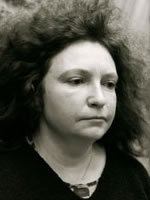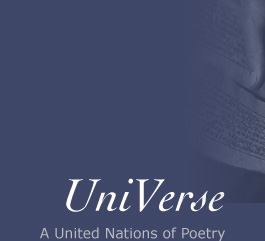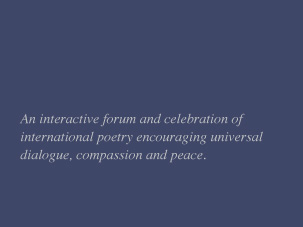| |
 |
 |
 |
 Amanda Aizpuriete was born in Jurmala in 1956 and studied philosophy and philology at the Latvian State University and at the M. Gorky Literary Institute in Moscow. Her books of poetry include Mother Will Come Into the Garden (1980), Dune Street (1986), The Next Bus (1990), The Last Summer (1995), The Outskirts of Babel (1999), A Flock of Rosy Pigeons (1999) and The Dispatch Wind (2004); a novel, The Night Swimmer, was published in 2000. She has been poetry editor for the magazine Avots (Wellspring) and co-editor of the newspaper Aspazija, the magazine Karogs (Flag), and Vides Vestis (The Herald). The American composer Eric Fank used Aizpuriete’s poetry for his symphony for contralto and full orchestra “This Evening Seems to have Gone Bad” and the mono-opera “Anna Ahmatova.” Aizpuriete has received the Bavarian Art Academy’s Poetry Award (1999) and the Days of Poetry Award in Latvia (2000), as well as the Annual Award in Literature for the Best Translation (2003). She has translated Ken Kesey’s “One Flew Over the Cuckoo’s Nest,” Franz Kafka’s “The Trial,” John Updike’s “The Witches of Eastwick,” Virginia Wolfe’s “Orlando,” in addition to other novels, and the poetry of, among others, Anna Ahmatova, Josef Brodski, Uve Kolbe, Georg Trakl. Aizpuriete has also put together several anthologies of Latvian poetry, and was a member of the Latvian delegation to the European writers’ event “Literature Express Europe 2000.” Amanda Aizpuriete was born in Jurmala in 1956 and studied philosophy and philology at the Latvian State University and at the M. Gorky Literary Institute in Moscow. Her books of poetry include Mother Will Come Into the Garden (1980), Dune Street (1986), The Next Bus (1990), The Last Summer (1995), The Outskirts of Babel (1999), A Flock of Rosy Pigeons (1999) and The Dispatch Wind (2004); a novel, The Night Swimmer, was published in 2000. She has been poetry editor for the magazine Avots (Wellspring) and co-editor of the newspaper Aspazija, the magazine Karogs (Flag), and Vides Vestis (The Herald). The American composer Eric Fank used Aizpuriete’s poetry for his symphony for contralto and full orchestra “This Evening Seems to have Gone Bad” and the mono-opera “Anna Ahmatova.” Aizpuriete has received the Bavarian Art Academy’s Poetry Award (1999) and the Days of Poetry Award in Latvia (2000), as well as the Annual Award in Literature for the Best Translation (2003). She has translated Ken Kesey’s “One Flew Over the Cuckoo’s Nest,” Franz Kafka’s “The Trial,” John Updike’s “The Witches of Eastwick,” Virginia Wolfe’s “Orlando,” in addition to other novels, and the poetry of, among others, Anna Ahmatova, Josef Brodski, Uve Kolbe, Georg Trakl. Aizpuriete has also put together several anthologies of Latvian poetry, and was a member of the Latvian delegation to the European writers’ event “Literature Express Europe 2000.”
Poems translated by Inara Cedrins.
|
|
|
Latvian version
[Ok, I don't have to dig my own]
Okei, man nav pašai
jarok sev kaps.
Paveicies piedzimt ramaka josla.
Drikstu saceret tumšas teiksmas
par saviem ciganu, židu un regu senciem,
un man neurbjas pakausi stobrs.
Bet tie skatieni – ka tie urbjas,
ka tie vardu akmeni lido…
Atnak pie sliekšna dzeltena zvaigznite,
saka: „Mani no debesim izstuma.
Drikst, es bušu tavs majas garinš?”
Tadas nu ir musu mierigas majas –
kaut kas videjs starp kapu un debesim.
English version
[Ok, I don't have to dig my own]
Ok, I don’t have to dig my own
grave. Have accomplished being born
in a more peaceful zone.
Am allowed to compose dark tales
about my gypsy, Jewish and phantom ancestors,
and no gun barrel digs into my forehead.
But those looks – how they bore,
how those stony words fly . . .
A yellow star arrives at the threshold
and says: “I was pushed out of heaven.
May I be your household spirit?”
Such are our peaceful homes now,
somewhere between the grave and sky.
|
|
|
Latvian version
[Where to carry you? Maybe to Ascension Street?]
Kurp tevi vest? Varbut uz Kapu ielu?
Ir tada iela – tuvu manam majam,
vel tuvak jurai. Nemanami sakas
un negaiditi beidzas.
Maz gajeju, daudz enu. Abpus darzi,
un viena – violetu tulpju straume.
Tas audze pardošanai, bet pirms tirgus
nak svetku bridis dikam verotajam.
Tads pusplaucis un puszagts prieks
ir dzejas verts.
English version
[Where to carry you? Maybe to Ascension Street?]
Where to carry you? Maybe to Ascension Street?
There is such a street – near my home,
still closer to the sea. Begins imperceptibly
and ends unexpectedly.
Few passersby, many shadows. On both sides, gardens,
and in one – a torrent of violet tulips.
They’re grown to sell, but before market
provide a sacred moment for the idle onlooker.
Such half-blossoming and half-stolen joy
is the worth of poetry.
|
|
|
Latvian version
[White stanza, washed completely white]
Balts pants, pavisam balti nomazgajies
tai struklaka, pie kuras nosirmojis hipijs
ka nosubejis piemineklis sed
uz vecpilsetas bruga. Manu pantin baltais,
nu kur tu tagad iesi? Pilseta ir melna
un nokvepusi tukstoš atbalsis.
Klau: vecis iesmejas, un visas vartu rumes
ar tukšiem smiekliem smejas preti.
Klau: ieraudajas pagatne, un brugis
ar sparnotajiem akmeniem raud preti.
Mans pantin baltais, tikai tev nav atbalss
nedz sodrejos, nedz kopus vecumdienas.
English version
[White stanza, washed completely white]
White stanza, washed completely white
in that stream, at which the hippie grown white-haired
like a lustreless monument sits
on the cobbles of the old town. My white couplet,
and now where will you lead? The city is black
and smoky from a thousand resonances.
Listen: the old one laughs, and the gate archway
responds with empty laughter.
Listen: the past cries out, and the cobbles
with winged stones cry out in response.
My whitened stanza, only you have no echo,
neither in soot nor in the caretakers of old age.
|
| [Forest stream. “Your palms are red from raspberries,] |
Latvian | English |
 |
|
 |
|
|
Latvian version
[Forest stream. “Your palms are red from raspberries,]
Mežavots. – Tev no avenem sarkanas plaukstas,
noskalo. – Udens tik dzidrs, ka negribas
sagandet pat ar vissaldako sulu.
- Nekaites. Udens šeit mužigi dzidrs, jo vina
te peldejas. Vina, kas stada pukes
uz pamestiem kapiem un aizmirstas dziesmas
savac. – Tu vinu redzeji?
- Ne, bet avots ir mužigi tirs. Noskalo rokas.
English version
[Forest stream. “Your palms are red from raspberries,]
Forest stream. “Your palms are red from raspberries,
rinse them.” Water so clear, I’m reluctant
to stain it with even the sweetest juice.
“It’ll do no harm. The water here is eternally clear,
because she swam here. She, who plants flowers
on abandoned graves and gathers up
forgotten songs.” Have you seen her?
“No, but the water is eternally clear. Rinse your hands.”
|
 |
 |
|
 |
|





